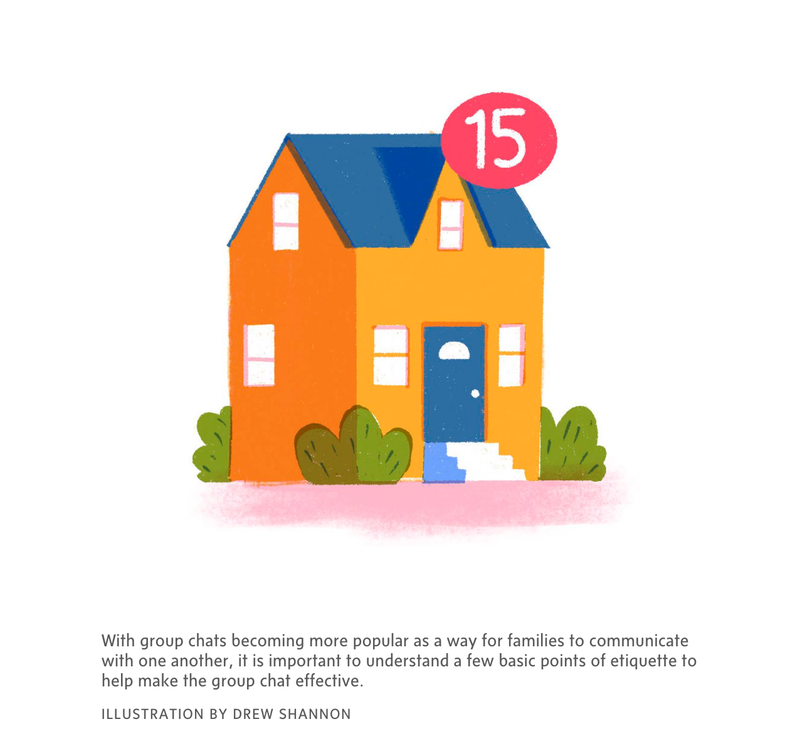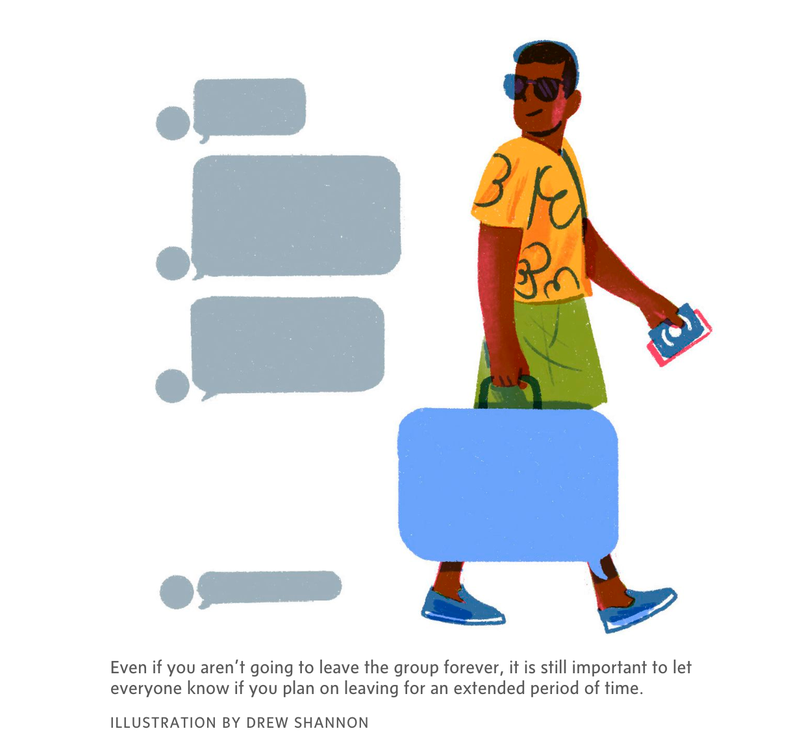
DAVE MCGINN
Feb. 20, 2020
When Mark Fraser thinks of something amusing, he usually won’t wait until he is home from work to share it with his family. Instead, he’ll open his phone to the group chat he shares with his wife and two sons and write them a quick message.
“If I see something I think is funny, I can immediately share it, instead of waiting until the end of the day to tell a dumb dad joke,” says Mr. Fraser, a 47-year-old consultant who lives in Halifax.
His family also uses the group chat for more practical purposes, including scheduling trips, deciding who’s taking the dog for a walk and generally keeping up with one another’s lives. Often, phones can distance families from one another, as everyone stares at their screens instead of spending quality time together, Mr. Fraser says.
“The group chat is an exception to that. It’s something that can really bring you together and remind you that you’re a unit."

Group-chat platforms, such as Facebook Messenger and WhatsApp, which allow users to share texts, images and videos with multiple people, have become the 21st-century version of family time. Group chats are a way to stay connected, particularly for families with members who live in different cities or even countries. They’re more informal than e-mail and less cumbersome than scheduling a time to Skype.
And true to Mr. Fraser’s point, research has shown that using group chats make family members feel closer to one another. But group chats are not completely free from the drama that so often affect families.
A survey conducted in 2018 by YouGov, an opinion and data company, found that 63 per cent of Americans use group chat to talk to their families, friends and co-workers. It is especially popular with millennials, with 67 per cent of them saying they use a group chat at least once a week.
While recent studies have suggested that using Facebook and other forms of social media can make people feel lonely, research has found that participating in group chats may have the opposite effect.
A study conducted by researchers at Edge Hill University found that talking to friends and family on WhatsApp improved a person’s psychological well-being. Of the 200 participants in the study, published last summer in the International Journal of Human-Computer Interaction, those who spent more time on the app reported having higher levels of self-esteem, felt less lonely and felt closer to their family thanks to interacting with them online.
“There’s lots of debate about whether spending time on social media is bad for our well-being but we’ve found it might not be as bad as we think," wrote Dr. Linda Kaye, a senior lecturer in psychology, who led the study. "The more time people spent on WhatsApp, the more this related to them feeling close to their friends and family and they perceived these relationships to be good quality.”
In his book Intergenerational Connections in Digital Families, Sakari Taipale, associate professor of social and public policy at University of Jyvaskyla in Finland, says mobile communication has given rise to “networked families” who “sustain and nurture family connections from afar.”
Montana Mason, a 24-year-old medical student, and her sister persuaded their parents to start a family group chat a couple of years ago. The two sisters would often text one parent thinking they would pass the information on to the other, but the messages wouldn’t be shared.
“We just got fed up with it,” Ms. Mason says.
A group chat, they decided, would allow them to all talk together. She attends McMaster University in Hamilton, Ont.; her sister lives in Edinburgh; and their parents live in Ottawa.
“I like it because I miss the hell out of my family a lot because I don’t often get to see them," she says. "It feels like I get to keep up with them and hear their dumb jokes and what’s going on with their lives rather than trying to set out a time when we can all Facetime or Skype,” she says.
Rosemarie Huber and her three daughters, one of whom lives at home with her in Niagara-on-the-Lake, a town in southwestern Ont., another who lives in Barrie, Ont., and the other who lives in Kelowna, B.C., have shared a group chat for several years now.
They’ve used it to plan family trips, send one another jokes and share advice on looking for jobs.
“It’s pretty instant, and I don’t really think about it that much. It’s convenient, everybody sees it at the same time, it’s easy to respond,” says Mrs. Huber, who works at a performing-arts centre in St. Catherines, Ont. “It’s not really a replacement for having everyone at home, but it makes you feel a little bit closer.”
While group chats allow families to share their thoughts with each other easily, they can become overwhelming, with frequent messages disrupting your day and distracting you from whatever you’re doing, says Carolyn Kane, an associate professor in the faculty of communication and design at Ryerson University in Toronto.
“People have to make decisions about where they want to put their energy and their time,” she says.
They can also become a flashpoint of family drama, especially among large families that have multiple people sending a stream of messages that can become irritating or overwhelming. But even smaller families are often not immune to tension in their group chats.
Komal Rana, a college student in Kitchener, Ont., has a family group chat with her father, who lives in Singapore, a sister in Texas and another sister and their mother, both of whom are in Ontario.
“My dad uses it every day to send us health stuff,” Ms. Rana says. That could be articles on the benefits of exercise or links to why they should eat more beans.
When her mother is angry, Ms. Rana can find out by looking at the group chat.
“Whenever she has an argument with any of us, she leaves the group chat,” Ms. Rana says. It’s the tech version of storming out of the room. “Once, it even went so far that she blocked us so we wouldn’t be able to add her back to the group chat.”
Does the group chat ever get annoying for Mr. Fraser and his family?
“For the parents, I don’t think it will ever get annoying, Those moments where you get unsolicited communication from your child, it’s good. If you were to ask my kids, yeah, it might get annoying for them,” he says.
But it has become an essential part of their family life.
“Without it, I don’t know how we would know what’s going on at any given time,” he says.

With group chats becoming more popular as a way for families to communicate with one another, it is important to understand a few basic points of etiquette to help make the group chat effective, from what counts as the bare minimum of participation to how to leave politely. Follow these basic points of order, says Mitchell Fawcett, vice-president of operations at Major Tom, a digital-marketing agency headquartered in Vancouver.
Stick to the program
What are you using your group chat for? The same family can have multiple chats for multiple purposes, whether it’s managing schedules or planning a coming trip. It’s why naming the group chat accordingly is so important.
“It’s key to keeping things organized,” Mr. Fawcett says. The name sets the intention for the group chat, and that will help keep everyone on topic.
“It can be really easy for people to go off on tangents,” he says.
Participate
“People’s comfort levels with chiming in, or even just their relationship with their phone, can be vastly different,” Mr. Fawcett says.
But if one person in the group isn’t participating at all, the rest are likely to get annoyed. You don’t need to weigh in on every comment with a lengthy one of your own, just meet the minimum standard for participation.
“Sometimes, reactions as opposed to full-on comments or engagement can be more helpful,” Mr. Fawcett says. That could mean simply giving a thumbs up to a comment. “I would consider that the bare minimum of participation."
How to leave
“There’s nothing quite as dramatic, especially if it’s on the tail end of an argument, as seeing that someone has left the group chat,” Mr. Fawcett says. “Leaving a group chat unannounced is one of the most heavy-handed actions you can take, in my opinion.”
Leaving a group chat without explaining why can not only come across as hostile and rude, it can leave other members of the group confused. If you decide to leave, be clear about why.

Tell people when you’re taking an extended break
Even if you aren’t going to leave the group forever, it is still important to let everyone know if you plan on leaving for an extended period of time. That way, they won’t be left wondering why you’re ignoring them. “If you are about to go on a two-week vacation and you really want to unplug, you can say ‘Hey everyone, I’m really trying to disconnect for the next couple of weeks. I’m going to leave this group chat. Talk to everyone soon,’ ” Mr. Fawcett says.
Use mute
Often times, family group chats can be incredibly active, sending a constant stream of updates to your phone. These can be distracting, especially if you’re at work or otherwise unable or uninterested in responding. Putting a chat on “mute” will spare you the frustration of ceaseless pinging alerts.
“If you don’t want notifications, you don’t need to get constant updates throughout,” Mr. Fawcett says. You can take a moment at the end of the day and catch up. The rest of the group will understand. “It’s a lot to ask for everyone to engage in a chat all day long,” he says.
Careful with the Jokes
There can be group chats with a large number of family members – aunts, uncles, cousins – some of whom you might have never even met in person. Sense of humour among people differs, and comments can easily be misread in a group chat.
“Text message and instant messaging have always been difficult because you totally lose context,” Mr. Fawcett says. That’s especially true of jokes, where you don’t get to see a person’s facial expressions or hear their tone of voice.
“A certain amount of decorum is required just to keep the peace and respect the high volume of people that are there.”
This Globe and Mail article was legally licensed by AdvisorStream.
© Copyright 2025 The Globe and Mail Inc. All rights reserved.


